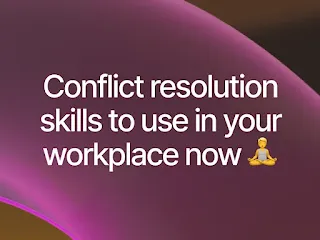Essential Role of Conflict Resolution Skills in the Workplace
- Get link
- X
- Other Apps
Meta Description:
Discover why conflict resolution skills are crucial in the workplace. Learn how these skills enhance teamwork, boost productivity, and create a harmonious work environment that drives organizational success.
Introduction
In any workplace, conflicts are inevitable. They arise from differing opinions, miscommunications, and competing interests. However, how these conflicts are managed can significantly impact the overall health and success of an organization. Conflict resolution skills are not just beneficial—they are essential. Here’s why developing and honing these skills can transform your workplace dynamics and contribute to a thriving organizational culture.
The Importance of Conflict Resolution Skills
Enhancing Communication and Collaboration:
- Effective conflict resolution requires open, honest communication. It encourages team members to articulate their perspectives and listen actively to others, fostering a collaborative environment where diverse ideas are valued.
Boosting Employee Morale and Engagement:
- When conflicts are resolved constructively, employees feel heard and respected. This boosts morale and engagement, as team members are more likely to feel invested in an organization that values their contributions and resolves issues fairly.
Promoting Innovation and Creativity:
- Constructive conflict resolution can lead to innovative solutions by encouraging different viewpoints and collaborative problem-solving. This dynamic drives creativity and helps teams to think outside the box.
Reducing Stress and Absenteeism:
- Unresolved conflicts can lead to a toxic work environment, increasing stress and absenteeism. Effective conflict resolution skills help to mitigate these issues, creating a healthier, more positive workplace.
Improving Productivity and Efficiency:
- Conflict resolution skills help to address issues quickly and effectively, minimizing disruptions and keeping teams focused on their goals. This leads to improved productivity and operational efficiency.
Strengthening Team Cohesion and Trust:
- Resolving conflicts fairly and respectfully builds trust among team members. It reinforces the idea that the team can handle challenges collectively, strengthening overall team cohesion.
Key Conflict Resolution Skills to Develop
Active Listening:
- Focus on understanding the other person’s perspective without interrupting or judging. This builds trust and shows that you value their viewpoint.
Empathy:
- Try to understand the emotions and motivations behind others’ positions. Empathy helps in finding common ground and fostering mutual respect.
Clear and Assertive Communication:
- Express your thoughts and needs clearly and assertively, without aggression. This helps in articulating your position while respecting others.
Problem-Solving and Negotiation:
- Approach conflicts with a problem-solving mindset, seeking win-win solutions that satisfy all parties involved.
Emotional Regulation:
- Manage your emotions and remain calm under pressure. This helps in maintaining a constructive dialogue and preventing conflicts from escalating.
Patience and Flexibility:
- Be patient and flexible in finding resolutions. Understanding that conflicts can take time to resolve helps in managing expectations and fostering a collaborative approach.
Conclusion
Developing conflict resolution skills is not just about managing disputes—it’s about fostering a positive, productive work environment where diverse perspectives are valued, and collaboration thrives. By equipping employees with these essential skills, organizations can turn conflicts into catalysts for growth and success, building a resilient and harmonious workplace culture.
Conflict resolution skills are the cornerstone of a thriving workplace. They empower employees to navigate challenges constructively, fostering a culture of respect, collaboration, and innovation. By prioritizing these skills, organizations can enhance team dynamics and drive long-term success.
- Get link
- X
- Other Apps




Comments
Post a Comment